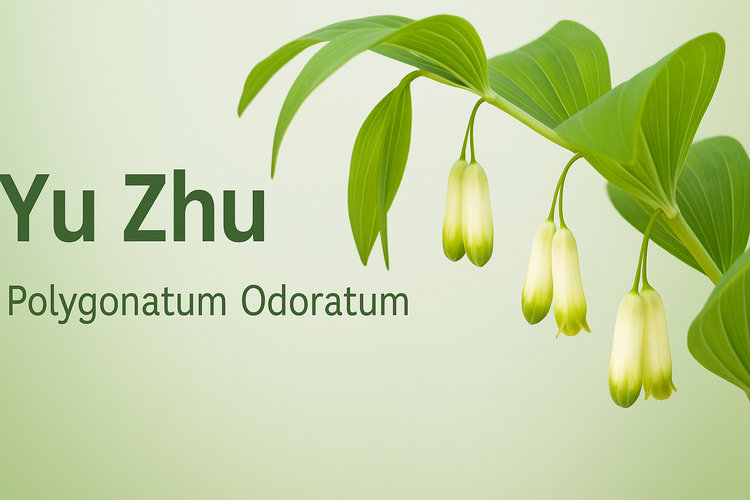Yu Zhu: The Lesser-Known Herb That Could Transform Your Skin, Lungs, and Energy
Posted by Sarah Aries Holistic Herbalist on Aug 5th 2025
Yu Zhu: The Lesser-Known Herb That Could Transform Your Skin, Lungs, and Energy
Yu Zhu (Polygonatum odoratum), or Solomon’s Seal Rhizome, is a traditional Chinese herb used to nourish Yin, moisten dryness, and support the lungs, skin, and digestive tract. Especially helpful in dry, depleted states, it offers gentle hydration without clogging or overheating the system.
On a personal note: What I Learned After Using Yu Zhu
Even though I live in Washington—a state most people associate with rain—our region in Eastern Washington is surprisingly dry, especially during the hot summers and early fall. It’s not uncommon to wake up each morning with a dry throat and parched skin, no matter how much water you drink.
After using Yu Zhu consistently, I began to notice subtle but powerful shifts—especially in areas I hadn’t realized were signs of internal dryness. My skin felt more supple, my throat wasn’t as scratchy in the mornings, and my digestion became noticeably smoother.
But what stood out the most was a deeper sense of inner balance—as if my body was finally receiving the quiet nourishment it had been missing, without feeling heavy or overstimulated. I didn’t expect an herb to feel so gentle yet so effective. It wasn’t dramatic—it was more like a gradual rehydration from the inside out.
For anyone living in a dry climate, feeling depleted, or struggling with internal dryness, Yu Zhu might just be the quiet, restorative herb your body’s been asking for.
What Is Yu Zhu?
Yu Zhu (玉竹), also known as Solomon’s Seal Rhizome, is a prized yin-nourishing herb in Traditional Chinese Medicine (TCM). It’s commonly used for:
-
Dry cough or throat
-
Dry, flaking skin
-
Yin deficiency with thirst
-
Irritability or fatigue in dry conditions
Unlike other moistening herbs, Yu Zhu doesn't trap pathogens or dampness, making it safe for long-term use—even in recovery after illness.
Quick Facts on Yu Zhu (Polygonatum odoratum)
| Category | Nourish Yin & Moisten Dryness |
|---|---|
| TCM Temperature | Slightly cold |
| Taste | Sweet |
| Organs Entered | Lung, Stomach |
| Best Form | Decoction or dried slices |
| Used In | Herbal teas, broths, soups |
| Botanical Name | Polygonatum odoratum |
| Common Names | Solomon’s Seal Rhizome, Yu Zhu |
Common Questions About Yu Zhu (Polygonatum Odoratum)
What Does Yu Zhu Do?
In Traditional Chinese Medicine (TCM), Yu Zhu is traditionally used to:
-
Nourish Yin without creating stagnation
-
Moisten internal dryness, especially in the Lungs and Stomach
-
Support hydration of the skin and improve elasticity
-
Soothe restlessness or irritability associated with internal heat
 What’s the best way to use Yu Zhu?
What’s the best way to use Yu Zhu?
Tea / Decoction (Most common):
-
Use 9–15g of sliced dried Yu Zhu
-
Simmer with other herbs for 20–30 minutes
-
Drink 1–2 cups daily
Soups:
-
Add to congee, bone broth, or herbal chicken soup
-
Especially great in autumn or after illness
Powder / Capsules:
-
Typically part of pre-formulated Yin-nourishing blends
Who May Benefit from Yu Zhu?
Yu Zhu may offer support for individuals experiencing:
-
A persistent dry throat or chronic dry cough
-
Dry, aging, or depleted skin
-
Mild fatigue from overexertion or periods of recovery
-
Irritability and thirst commonly linked to Yin deficiency
-
Post-illness heat signs, including those following antibiotic use
It is often included in herbal blends intended for post-viral recovery, menopause support, and moistening of the Lungs.
Who Should Not Use Yu Zhu?
Yu Zhu may not be appropriate in the following cases:
-
When there is significant dampness or phlegm accumulation
(such as a greasy tongue coating, digestive bloating, or sluggish metabolism) -
Loose stools or diarrhea, particularly from cold-type digestive patterns
-
Active symptoms of cold or flu
(Yu Zhu is typically recommended during the recovery phase, not during acute infection)
Consult a qualified healthcare practitioner for guidance tailored to your condition.
What Does Yu Zhu Taste Like?
-
Flavor: Mild and slightly sweet
-
Texture: Soft and chewy when cooked
-
Preparation Notes: In teas or soups, it imparts a gentle, cooling sweetness
Yu Zhu is often described as calming and replenishing—providing internal hydration without feeling heavy or overly stimulating.
What Makes Yu Zhu Special in TCM?
Yu Zhu is known as a "lightweight yin tonic"—meaning it moisturizes tissues without creating damp or greasy buildup.
It enters the Lung and Stomach channels, which are often the first affected in dry, hot conditions—like:
-
Recovery after fever
-
Long-term antibiotic use
-
Menopause-related dryness
 Historical & Cultural Use
Historical & Cultural Use
A Legacy Rooted in Survival and Vitality
Yu Zhu has a long and respected history in Traditional Chinese Medicine, with its earliest documentation found in the Shen Nong Ben Cao Jing (Divine Farmer's Classic of Materia Medica)—one of the foundational herbal texts of Chinese medicine. It was later praised in the Ben Cao Gang Mu (Compendium of Materia Medica) by Li Shi-Zhen, a Ming Dynasty physician whose encyclopedic work is still considered a cornerstone of TCM herbalism today.
Historically, Yu Zhu was more than just a medicinal root—it was a lifeline during hard times. In periods of famine or hardship, Yu Zhu was often harvested and consumed to help nourish Yin and replenish fluids when food and water were scarce. Its naturally moistening quality made it especially valuable in times when dehydration and internal dryness were common concerns.
In Taoist and traditional health practices, it was also used to "nourish without stagnating," making it a go-to herb for maintaining balance when resources were limited. Its cooling, slightly sweet nature helped calm internal heat while gently supporting the body's ability to retain moisture and energy—a combination that earned it a reputation as both a survival food and a wellness tonic.
Today, Yu Zhu is still regarded as a gentle yet powerful way to support internal hydration, especially in dry climates, during recovery periods, or in cases of Yin deficiency from overwork or illness.
Safety & Precautions
-
Always consult a healthcare provider if pregnant, nursing, or taking medications
-
Discontinue if you experience bloating, loose stools, or excess mucus
Shop Yu Zhu & Related Products
What Does Modern Research Say?
While Yu Zhu is primarily used in traditional formulas, research has explored its:
-
Polysaccharides and saponins: May support immune modulation
-
Antioxidant effects: Help reduce oxidative stress
-
Moisturizing compounds: Support epithelial hydration (gut, lungs, skin)
-
Molecular fingerprinting of its polysaccharides reveals effects on gut-lung balance
-
Yu‑Zhu polysaccharides demonstrated microbial fermentation activity with Lactobacillus johnsonii—supporting gut health and indirectly influencing respiratory function.
PubMed+15PubMed+15PMC+15ScienceDirect
-
-
Comprehensive genus Polygonatum review
-
This review summarizes traditional use alongside modern findings including antioxidative, anti-fatigue, blood sugar support, and immune-modulating effects of Polygonatum odoratum.
BioMed Central+2PubMed+2PMC+2
-
-
Polysaccharide-rich extract reduces inflammatory airway damage
-
In animal studies, Polygonatum polysaccharides helped mitigate allergic airway inflammation—suggesting benefit to lung and gut‑related immunity.
PubMed+14ScienceDirect+14PMC+14
-
-
Gastroprotective and lung-moistening activity
-
Confirmed traditional TCM uses—Yu Zhu supports lung and digestive comfort by protecting tissue and reducing inflammation.
PubMed+8PMC+8BioMed Central+8
-


